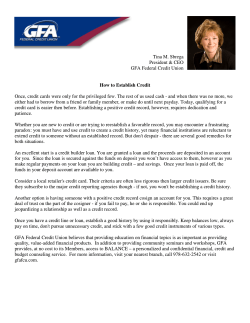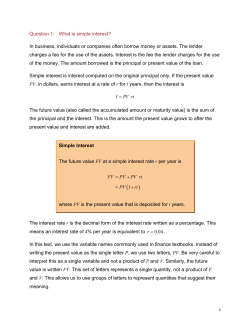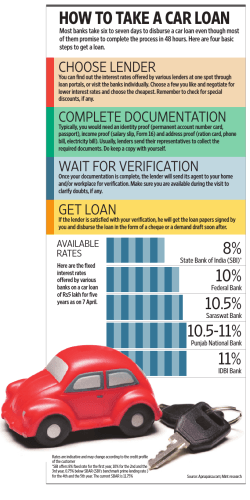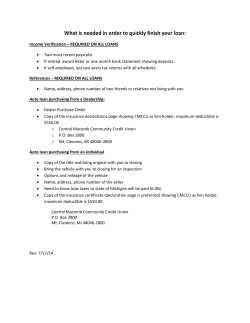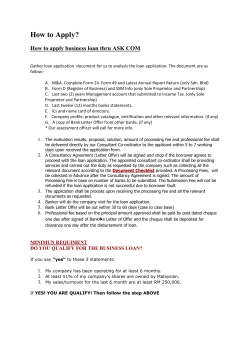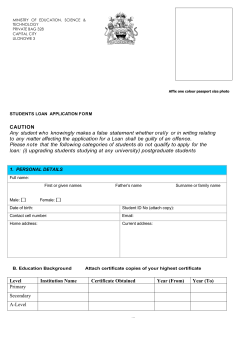
You’ve Applied For Your Mortgage. What Happens Next?
You’ve Applied For Your Mortgage. What Happens Next? A Simple Guide To Help You Through The Mortgage Process Four Easy Steps You have found the right home at the right price in the right location. Now it’s time to focus on your home financing. This guide can help you feel more comfortable with the mortgage process by giving you a better idea of what to expect. Your application has been taken by a loan officer or mortgage broker, who will see that you receive a loan decision as quickly as possible and move even closer to achieving your homeownership goals. So, what happens next? The terms that appear in boldface throughout this guide are defined in the glossary. 1. Processing Your loan officer or mortgage broker has asked you a number of questions at application. Your answers, your credit report information, and the loan program you’ve applied for will help determine if you qualify for instant mortgage approval using an automated underwriting system. Another processing option may be better suited to your needs. Documentation requirements vary, depending on the loan program, underwriting method and your own financial and credit profile. In some cases only minimal documentation is required. In other cases more detailed documentation may be required. An appraisal will be ordered at application to determine the fair market value of the property you are purchasing. You can either lock in your range of rates (rate lock) or float your loan pricing. It is important to discuss these options with your loan officer or mortgage broker. At application or shortly after, you will receive a Good Faith Estimate and a Truth-in-Lending Statement, which will show your annual percentage rate (APR). These documents are required by federal law and disclose the credit terms of your loan and approximate closing costs. Please see “annual percentage rate” in the glossary for a complete explanation. 2. Underwriting If you received instant approval at application, you were given a conditional credit approval letter. If another processing option was determined to be best, your file is reviewed by an underwriter to make a decision on your loan application. An underwriter is a trained credit-risk analyst who will do everything possible to help you receive loan approval. Soon after your application is approved (instantly or by an underwriter), you will receive a commitment letter1 that explains the terms of your loan, including any loan conditions that need to be met prior to closing. Read your commitment letter carefully, and be sure to follow the instructions to ensure a timely closing. In the case that your application is not approved, your loan officer or mortgage broker can help you determine what actions need to be taken. 3. Pre-Closing Prior to loan closing, your loan officer or mortgage broker may ask you to provide: • A copy of your homeowners or “hazard” insurance policy and a one-year paid receipt. • A copy of the flood insurance policy and paid receipt if the property is in a flood zone. • Evidence that you have satisfied all outstanding loan conditions listed in your commitment letter. • Evidence that any required inspections have been conducted. These requirements vary, depending on the type of financing you choose and the region where you live. • A Certificate of Occupancy may be required if you are purchasing a newly constructed home or one that has undergone certain types of renovations. It’s time to schedule your closing date. All involved parties will be contacted to arrange a convenient time and location. Closing procedures and associated fees vary depending on where you live. You will be notified of the exact amount you will need to close your loan. This amount is payable by certified or cashier’s check. 1. In New Jersey it will occur after the appraisal. 4. Closing At closing, a closing agent will review the terms of your loan and explain each document. The closing agent will also provide you with a copy of the HUD-1 Settlement Statement, which shows all the costs related to the closing. These costs may include, but are not limited to, the down payment, loan origination fee, survey, appraisal, inspections, and title search costs. Some loans may require mortgage insurance if your down payment is less than 20%. In addition, you will be responsible for various prepaid expenses, including interim interest. An escrow account may be established at the time of closing. Your initial escrow account deposit will cover real estate taxes, hazard insurance, and your mortgage insurance if applicable. Your loan servicer will pay your taxes and insurance premiums from this account when they come due. You will either be given or mailed a first payment letter. This document states how much your monthly loan payment will be and instructs you where and when to send your initial payment. Congratulations! You have completed the mortgage process. For further information, please contact: Dan Clifton Mortgage Loan Originator Phone: (407) 681-0777 Cell: (407) 252-3039 670 N Orlando Ave Suite 101 Maitland, FL 32751 [email protected] www.CliftonServices.com Glossary Annual Percentage Rate (APR) – The percentage relationship of the total finance charge to the amount of the loan, over the life of the loan. Do not confuse APR with your quoted interest rate, which is used to determine your monthly principal and interest payment. The APR reflects the cost of your mortgage loan as a yearly rate. It will be higher than the interest rate stated on the note because it includes (in addition to the interest rate) loan points, fees and mortgage insurance. See Note and Points. Credit Report – A report issued by an independent agency that contains certain information concerning a mortgage applicant’s credit history and current credit standing. Appraisal – A report written by a qualified professional that states an opinion on the value of a property based on its characteristics and the selling prices of similar or comparable properties in the area. Escrow Account – A holding account into which the mortgage borrower pays each month and from which the loan servicer pays the borrower’s taxes, other periodic debts against the property, homeowners insurance, and mortgage insurance, if applicable. Certificate of Occupancy – Written authorization given by a local municipality that allows a newly constructed, or substantially renovated, structure to be inhabited. Closing – The final step after a lender approves a loan application. The homebuyer and lender sign the security agreement note for the mortgage, which states all the terms and conditions of the loan, and the loan funds are turned over to the homebuyer’s closing agent. Closing Agent – Usually an attorney or title agency representative, who oversees the closing and witnesses signing of the closing documents. Closing Costs – The costs paid by the mortgage borrower (and sometimes the seller) in addition to the purchase price of the property. These include the lender’s fees, title fees, and appraisal costs. Commitment Letter – A binding, written pledge, by the lender to a mortgage applicant, to make a loan, usually under certain stated conditions. Down Payment – A portion of the sales price paid to the seller by the homebuyer to close the sales transaction. Also, the difference between the sales price and the mortgage amount. Float the Rate – Rather than locking in an interest rate at application, a mortgage applicant may choose to wait and watch interest rates fluctuate before deciding to lock in — usually no later than five days prior to closing. Flood Insurance – Insurance required by a lender against flood damage for properties located in areas designated by the federal government as special flood hazard areas. Good Faith Estimate –A document that tells mortgage borrowers the approximate costs they will pay at or before closing, based on common practice in the locality. Homeowners Insurance (also called Hazard Insurance) – A real estate insurance policy required of the buyer to protect the property against loss caused by fire, some natural causes, vandalism and other events. May also include added coverage such as personal liability and theft away from the home. HUD-1 Settlement Statement – A standard form used to disclose costs at closing. Glossary Interest Rate – The portion of the mortgage amount that is paid to the lender for the use of the money advanced through the loan, usually expressed as an annual percentage. Interim Interest – The interest that accrues, on a per-diem basis, from the day of closing until the end of the month. Mortgage Insurance – An insurance policy that will repay a portion of the loan if the borrower does not make payments as agreed upon in the note. Mortgage insurance may be required when the borrower makes a down payment of less than 20% on a home. Origination Fee – The amount collected by the lender for making the loan. It is generally equal to a percentage of the principal amount borrowed. Prepaids – The portion of your loan closing costs which must be collected as closing to cover taxes, interest and insurance. Rate Lock – The borrower and the lender agree to protect the interest rate, points and term of the loan while it is processed. Servicer – The mortgage banking entity that handles the receipt of payments from borrower, customer service, escrow administration (including timely payment of taxes and insurance on the borrower’s behalf), investor accounting, collections, and foreclosures. Survey – A drawing, prepared by a registered surveyor, showing the legal boundaries of a property. Title Search – An examination of public records, laws, and court decisions to ensure that no one except the seller has valid claim to the property and to disclose past and current facts regarding ownership of the property. Truth-in-Lending Statement – Required by federal regulations, this statement tells consumers the cost of financing their loan expressed as the annual percentage rate (APR), and it discloses all material terms of the loan including the number of payments, payment amounts and other information. Underwriting – The process of reviewing loan application, documentation and property information prior to providing a loan approval decision. This information is accurate as of date of printing and is subject to change without notice. 102459-1/08
© Copyright 2026
